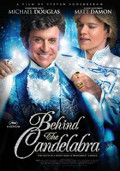
Directed by
Steven Soderbergh
118 minutes
Rated M
Reviewed by
Bernard Hemingway


Behind The Candelabra
Synopsis: An account of the 6-year relationship between Liberace (Michael Douglas) and his much younger lover, Scott Thorson (Matt Damon).
Michael Douglas as Liberace and Matt Damon as his toyboy? How good a concept is that? Even if it’s bad it’s got to be good. And good and bad are very much the twin poles of Steven Soderbergh’s film.
For a start, Behind The Candelabra is a very good film. Made for HBO Films, as you would expect, it is a top-drawer effort with to-die-for '70s art direction and production design that accounts for half the fun and marvellously self-abnegating performances from Michael Douglas and Matt Damon that account for the other. Below the line, scriptwriter Richard LaGravenese’s adaptation of Scott Thorson’s tell-all book and Steven Soderbergh’s characteristically polished direction make for a high quality film albeit one that will not appeal to everyone.
For the most part Soderbergh takes a suitably camp approach to the story, revelling in the palatially kitsch lifestyle that was Liberace’s stock-in-trade as much at his Las Vegas home as it was on the Las Vegas stage. All this is decidedly in the so-bad-it’s good territory although the sight of Matt Damon humping Michael Douglas for most people will be just plain bad.
But this is Soderbergh not John Waters and so there is dark side that emerges out of the narcissistic self-indulgence. The balance starts to shift when Liberace calls in a cosmetic surgeon Dr Jack Startz (Rob Lowe) and arranges not just a face-lift for himself but a make-over for Scott to make him look like a younger version of Liberace himself. We of course know that this is going to end badly and indeed starting with the close-ups of Dr Startz’s scalpel cutting the pair’s face, all to the accompaniment of Liberace’s tinkling piano-playing, the film moves into increasingly sombre territory.
Unlike Soderbergh’s thematically-related Magic Mike this is done to convincing dramatic effect. Of course, this is on one level is good but it is also true that one misses the delicious flamboyance of happier days. There is a slight return to it at the film’s end but it is too steeped in sadness to work in the way of the familiar, crowd-pleasing closing device (as with,for example, the “Love Is In The Air” finale of Strictly Ballroom). And, at least from the Liberacean point of view, that is bad even if it earns Soderbergh more respect artistically, for, indeed, such is life, or as glam-rockers Roxy Music once put it: "In every dream home there's a heartache".
Want something different?





